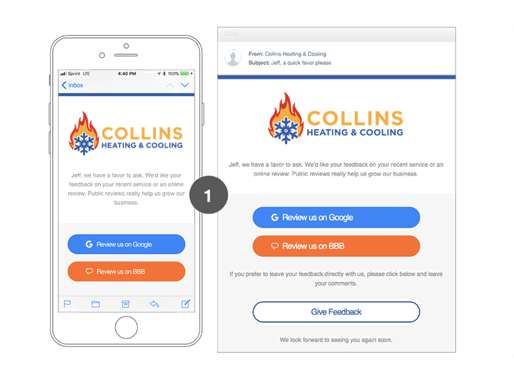What is Online Reputation Management?
Online reputation management (ORM) is the process of monitoring, influencing, and controlling an individual or organization’s reputation on the internet. This involves monitoring mentions of their name, brand, products or services, and addressing negative content or feedback to maintain a positive image and build a strong online presence.
The goal of ORM is to improve or restore a positive reputation, protect against potential harm, maintain brand integrity, and improve customer service relations.
Power your business with online reviews and customer feedback.
Capture your 3rd party review in just one step:
- Grow your revenue and marketing by impacting SEO, reviews, and social proof
- Reduce negative reviews by making feedback easy for your customers
- Save time and money with a simple, robust and actionable solution


Why is Reputation Management Important for SEO?
Reputation management is important for SEO because search engines like Google use the information they find on the internet to rank websites and determine the relevance of search results. This means that a positive online reputation can improve search engine visibility and rankings, while a negative reputation can harm them.
Many clients wonder if they need this service at all. The answer is yes. The faster you can respond to a negative complaint or appreciate a positive one, increases your trust online and improves customer relations.
For example, if a company has a lot of positive online reviews and mentions, this can signal to search engines that the company is reputable and trustworthy, leading to higher search engine rankings.
However, if there is negative information about a company online, such as complaints or negative reviews, search engines may view the company as less reputable and trustworthy, which can lead to lower rankings and less visibility in search results.
Reputation Management
What’s Your Reputation Score? Fill out the form and see where you stand! Once you complete the form, your score will be emailed to you in a few minutes
Your online relationship with clients can be seen by all. How you manage ratings, communications and respond to public postings matter to your overall reputation. We help you get control of this process by providing an online reputation management widget on your home page, with your own custom manager hub portal where you can manage it all. Whether it’s on Google, Bing, Facebook, and more.
Most consumers rely on reviews in decision making, so it’s not just the search engine who makes choices based on reviews. This is how online reputation management can directly impact SEO, as it helps to ensure that a company’s online image is positive, which can result in higher search engine rankings, more visibility and ultimately, more traffic to their website.
Contact us today to see what we can do for you.
What are Reputation Management Best Practices?
Here are some of the best practices for online reputation management:
1. Monitor your online presence: Regularly monitor your online presence to track what is being said about you, your brand or your company. This can include monitoring social media, forums, news websites, and review sites.
2. Respond immediately to negative feedback: Respond to negative feedback in a professional and timely manner. Address the issue and try to resolve it to the best of your ability. Don’t be defensive or argue, just mitigate. It’s not worth your time to fight.
3. Encourage positive reviews: Encourage customers to leave positive reviews on review sites and social media. Respond to positive feedback and thank the customer for their support.
4. Foster transparency: Be transparent in your interactions with customers and online communities. This can include responding to inquiries and questions in a timely manner and providing accurate information.
5. Create high-quality content: Create high-quality, relevant and informative content that is optimized for search engines. This can include blog posts, videos, infographics and other types of content.
6. Engage with your audience: Engage with your audience through social media and other online platforms. This can help you to build a positive online reputation and increase your visibility.
7. Use social media monitoring tools: Use social media monitoring tools to keep track of mentions of your brand, company or products.
8. Avoid negative SEO tactics: Avoid negative or “black hat” SEO tactics, such as buying fake reviews, creating fake social media accounts, or engaging in other deceptive practices. These tactics can harm your online reputation and potentially result in penalties from search engines.
These are just some of the best practices for online reputation management, but the specific steps you need to take will depend on the specific needs and goals of your company.
We provide several affordable options for online reputation management, including tracking and keeping your NAP’s up to date across search engines, and a widget where you can directly respond or divert responses to the right customer service person in order to improve your online presence. Along with our ADA compliance widget, you can improve trust across the digital landscape. Call or email us today to get started.
